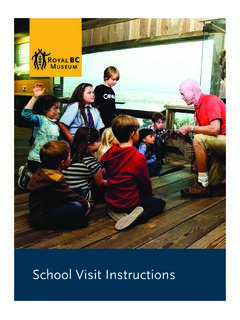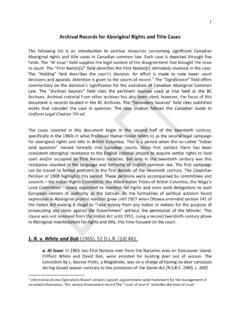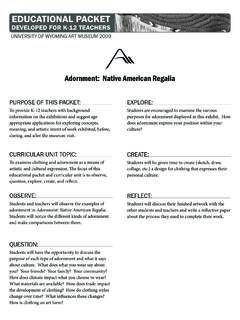Transcription of 1frRoYAL BC MusEuM
1 1frRoYAL BC MusEuM . Collections Policy Introduced February 2003. Updated 2012. Revised May 2017. PURPOSE. The MusEuM Act [SBC 2003, c. 12) mandates the Royal British Columbia MusEuM and Archives to "secure, receive and preserve specimens, artifacts and archival and other materials that illustrate the natural or human history of British Columbia," and defines "collection" as "the specimens, artifacts, archival material and associated records [that are) kept by [the Royal BC MusEuM and Archives).". The purpose of the Collections Policy is to establish guidelines for the growth, management and care of and access to the specimens, artifacts, archival materials and associated records ("items") that have been approved for accession by the Royal BC MusEuM and Archives' Collections Committee.]]]
2 SCOPE. The policy applies the Royal BC MusEuM and Archives' Board of Directors, Collections Committee, and staff (in particular those working in the Knowledge;. Collections Care and Conservation; Archives, Access and Digital; and First Nations and Repatriation Program departments) . The Royal BC MusEuM and Archives maintains three categories of collections: 1. The permanent collection, comprised of accessioned items .accorded the highest standard of care and overseen by curators, collection managers and archivists. 2. The handling collection, comprised of non-accessioned items that are cared for responsibly by learning staff for use in school and public programs.
3 3. The asset collection, comprised of non-accessioned items that are cared for responsibly by facilities management and exhibitions staff and used to articulate the MusEuM precinct or exhibits. The permanent collection comprises three collecting domains : 1. The natural history collection 2. The human history collection 3. The archival collection The natural history collection comprises complete specimens (or parts, including genetic samples, thereof) of species found in, or of direct relevance to, British Columbia (BC). The collection focuses on the fields of ichthyology, herpetology, ornithology, mammalogy, paleontology, invertebrate zoology, entomology and botany.
4 ORCS 22100 Page 1 of 10. Collections Policy The human history collection comprises items that record the tangible and intangible cultural heritage of BC. The collection focuses on archaeology and on First Nations, settler and post-settler history. The archival collection comprises items of enduring value to BC regardless of their form or media. The collection contains textual and born-digital records, film, video and sound recordings, photographs, documentary art, maps and publications . POLICY STATEMENT. Principles and Guidelines The Royal BC MusEuM and Archives collects in accordance with relevant Canadian legislation and international obligations, specifically those listed in Appendix 1.
5 The Royal BC MusEuM and Archives abide by the codes of ethics set out by the International Council of museums , the Canadian museums Association, the Internationa l Council on Archives, the Association of Canadian Archivists, the Canadian Association for Conservation of Cultural Property and the Canadian Association of Professional Conservators. Governance Curators and archivists hold primary responsibility for the development of the collections. Together with collection managers, they implement the collections policy in accordance with the collections strategy and direct collection development and organization.
6 Collection managers are responsible for all day-to-day activities that involve the management and use of items. The registrar is responsible for managing and accounting for centralized collection records and handling legal issues and logistics . Conservators are responsible for risk management, preventative conservation and conservation treatments . The Collections Committee is responsible for approving accessions and deaccessions in accordance with the collections strategy and delegated authority levels set by the Board of Dire ctors . ORCS 22100 Page 2 of 10. Collections Policy Acquisition Items are acquired for the permanent collection through deposit and selective acquisition.
7 Deposit The Royal BC MusEuM and Archives is the official repository for provincial governmental archives in a non-digital form, as outlined in Section 4 of the MusEuM Act and Section 14 of the Information Management Act. The transfer and acquisition of non-digital government records is in accordance with record schedules approved under the Information Management Act. The Royal BC MusEuM and Archives is the main provincial repository for archaeological materials. The transfer and acquisition of archaeological materials under permit is in accordance with the Heritage Conservation Act. The Royal BC MusEuM and Archives is also the identified repository for paleontological and appropriately designated type specimens.
8 The Royal BC MusEuM and Archives is a designated repository for voucher specimens . Selective Acquisition The Royal BC MusEuM and Archives acquires items through donation, strategic collecting, benefaction, exchange and purchase. An item can only be acquired under the following conditions : 1. The item is of significance to the province. Significance refers to the values and/or meanings that an item has for people and communities . Whether an item is significant is determined by assessing its value by means of four primary criteria: historic; artistic or aesthetic; scientific or research potential.
9 Social or spiritual. The degree to which an item is significant is determined by four comparative criteria: provenance ; rarity or representativeness; condition or completeness; interpretive capacity . 2. Acquisition of the item supports a goal of the collections strategy. 3. There must be adequate storage space to accommodate the item. 4. There must be a reasonable expectation of securing funding for the item's storage, care and conservation. 5. The item is accompanied by warranties of good legal title where appropriate. 6. The item is accompanied by a good record of provenance and must be authenticated where appropriate.
10 Exceptions will be reviewed on a case-by- case basis. 7. The item is valued where appropriate . 8. The item is accompanied by a bill of sale or other statement signed by the ORCS 22100 Page 3 of 10. Collections Policy owner transferring ownership, and if applicable, transferring of copyright as defined in the Copyright Act [RSC 1985, ]. 9. Donation of the item is free and clear of conditions and restrictions. 10. Donation of the item is irrevocable upon the formal transfer (with a signed Deed of Gift) of title to Royal BC MusEuM and Archives . 11. The Royal BC MusEuM and Archives receives all rights necessary to permit the exhibition and non-co,mmercial reproduction of the item.



